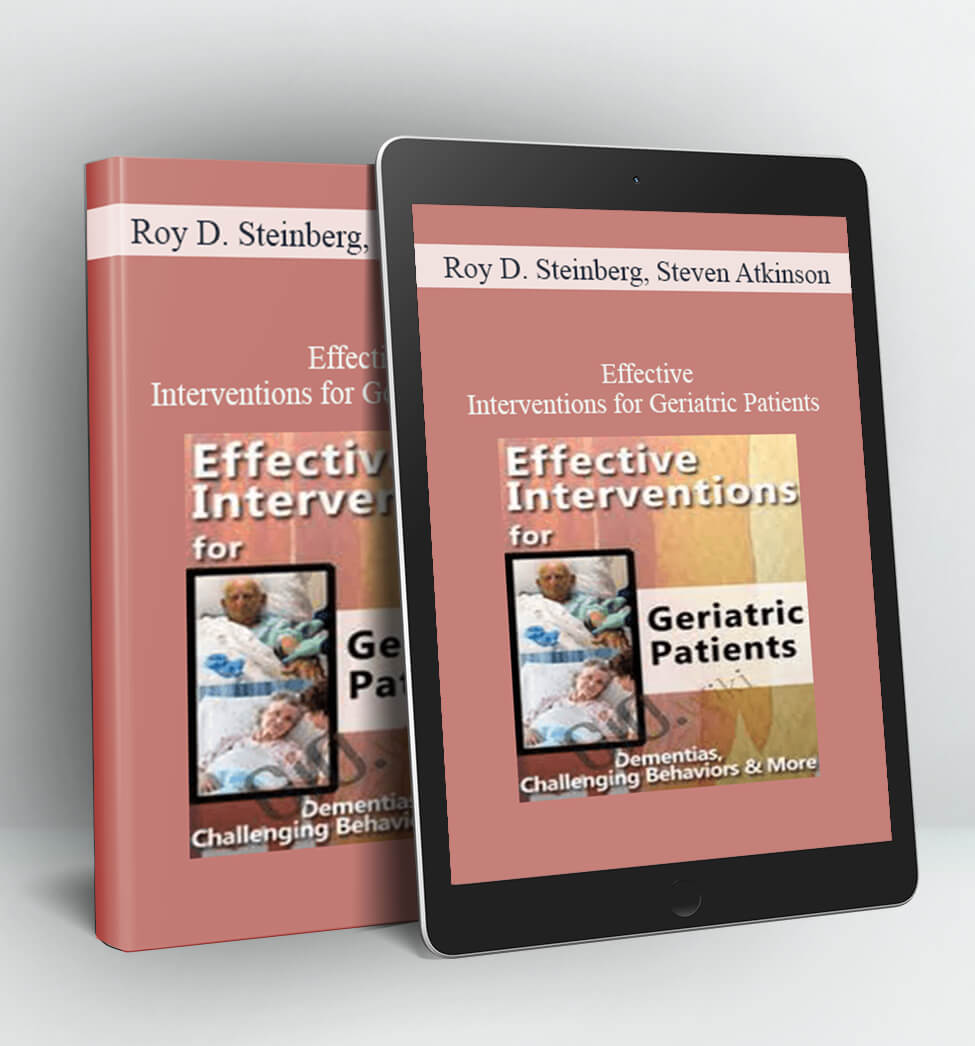Effective Intes for Geriatric Patientrventions: Dementias, Challenging Behaviors & More – Roy D. Steinberg, Steven Atkinson
Everybody ages…but there is no “one size fits all” model to aging, so you never know what your geriatric patient might experience. That’s why it’s important that EVERY healthcare professional know how to address the unique concerns of the older adults under our care.
Geriatrics is a field on its own, yet there are very little learning opportunities for this specialized population. Join two of the best, internationally recognized, geriatric experts in this revolutionary online course and get step-by-step guidance to caring for patients with Alzheimer’s Disease, Vascular Dementia, Parkinson’s disease, Frontotemporal Dementia, Lewy Body Dementia, Aggression, Depression and so many more.
This high-energy course is filled with interesting case studies, insightful discussions, evaluation strategies, and interventions to leave you feeling confident in your ability to intervene with Alzheimer’s and various other dementias that affect your patients.
Your geriatric patients have made countless memories and they aren’t done yet… enroll in this course today to get innovative and practical intervention strategies you can use immediately to improve your patients’ quality of life!
Here’s what this intensive online course covers:
The Aging Brain
Mental Health Evaluation
- Depression
- Anxiety
- Alcohol Abuse
Cognitive Disorder and “Forgetfulness”
- Transient Cognitive Decline
- Pre-cursor to dementia
- Mild Neuro-Cognitive Disorder
Diagnostics of Dementing Conditions
- Alzheimer’s
- Vascular
- Parkinson’s
- Lewy Body
- Frontotemporal
- Reversible Conditions
Cognitive Assessment Tools
- Mini-Mental State Examination
- SLUMS
- Clinical applications
- Administration and scoring
- Objective and subjective interpretation
- Therapy modalities
Differentiate Dementia and Depression
- Clinical indicators of depression and anxiety
- Practical application
Psychopharmacology
- Early and Mid-stage Alzheimer’s – Acetylcholinesterace Inhibitors
- Mid and Late-stage Alzheimer’s – Neurotransmitter Glutamate
- Alternate interventions
Behavioral Interventions
- Intervention strategies for depression, poor appetite, verbal and physical combativeness, refusing ADL care
- Strategies for coping mechanisms for the caregiver and clinician
Working with Caregivers at Home & Ethics
- Caregiver guilt
- Depression
- Responsibility to client
- Reporting abuse
- Power of Attorney
- Documentation
Challenging Geriatric Behaviors
Normal Aging, Dementia, Depression or Delirium
- Normal aging changes of the mind
- Depression, dementia, and delirium
- Alzheimer’s disease and other dementias
- Diagnose, differentiate, and develop a plan of care
Alzheimer’s Disease
- Stages
- Assessment
- Getting a diagnosis
- Behavioral issues of early diagnosis
- Management and interventions
- Pharmacological treatments
Driving with Dementia
- Driving safety
- Legal issues
- Assess driving abilities
- How to take the keys away
Wandering
- Reasons why cognitively impaired individuals wander
- Is wandering a bad thing?
- Issues to consider
- Manage a wanderer’s behavior
Physical Aggression
- Identify the cause of aggression
- Loss of impulse control
- Regression of the mind/child-like mind
- Manage the problem
Inappropriate Sexual Behaviors
- Normal sexual drive or inappropriate behavior
- Cognitively impaired individuals
- Medication management
- Ethical considerations
Refusing to Eat/Forgetting to Eat
- Reasons why geriatric patients slow or stop eating
- Nutritional needs in a geriatric patient
- Improve nutritional status
- Malnutrition and dehydration
- Alternatives to eating
Sleepless Nights
- Sundowning and behavioral problems in the evening
- Why does sundowning occur?
- Environmental interventions to decrease aggressive behaviors
- Medication management when it becomes problematic
Caregiver Stress
- Physical, psychological, and emotional stress
- Identify caregiver burnout and ways to help
- Assist the caregiver
Other Issues
- Ways to identify potential falls and prevent injury
- Causes for orthostatic hypotension
- Ways to avoid using restraints
PLEASE CHECK VIDEO OF ALL CONTENTS:
Delivery Method:
After your purchase, you’ll get access to the downloads page. Here, you can download all the files associated with your order.
Downloads are available once your payment is confirmed, we’ll also send you a download notification email separate from any transaction notification emails you receive from Vinlearn.




